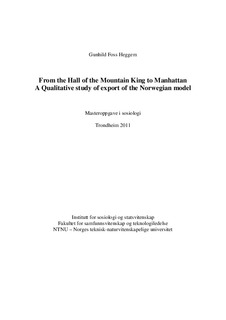| dc.contributor.advisor | Kvande, Elin | nb_NO |
| dc.contributor.author | Heggem, Gunhild Foss | nb_NO |
| dc.date.accessioned | 2014-12-19T14:35:54Z | |
| dc.date.available | 2014-12-19T14:35:54Z | |
| dc.date.created | 2012-01-16 | nb_NO |
| dc.date.issued | 2011 | nb_NO |
| dc.identifier | 478563 | nb_NO |
| dc.identifier.uri | http://hdl.handle.net/11250/268467 | |
| dc.description.abstract | The world is becoming increasingly more globalized, and different organizational practices are being exported and adopted by companies around the world. This creates challenges for companies operating across boarders. And for the Norwegian model, it is a threat to Norwegian working hours. This thesis will examine what happens to the Norwegian model when it is being exported to a country with a different institutional context, i.e. a different welfare state regime than the Norwegian. Can the Norwegian model be exported, and how does it translate into an American context? The answer to the question is yes. The Norwegian model can be exported, but what we see is an adaptation to the institutional context in the host country. Using time practices and time norms as a point of focus, we see that in the process of adapting the model in the architecture company Snøhetta’s New York office, negotiations are taking place among the employees and the management. It is not only the different welfare state regimes and institutional context of the United States and Norway that challenge the Norwegian model in general and working hours in particular, the knowledge work in itself also constitutes a threat. Having a strong emphasis on time disciplining regulations becomes an important factor when dealing with this threat. | nb_NO |
| dc.language | eng | nb_NO |
| dc.publisher | Norges teknisk-naturvitenskapelige universitet, Fakultet for samfunnsvitenskap og teknologiledelse, Institutt for sosiologi og statsvitenskap | nb_NO |
| dc.title | From the Hall of the Mountain King to Manhattan: A qualitative study of export of the Norwegian model | nb_NO |
| dc.type | Master thesis | nb_NO |
| dc.contributor.department | Norges teknisk-naturvitenskapelige universitet, Fakultet for samfunnsvitenskap og teknologiledelse, Institutt for sosiologi og statsvitenskap | nb_NO |
